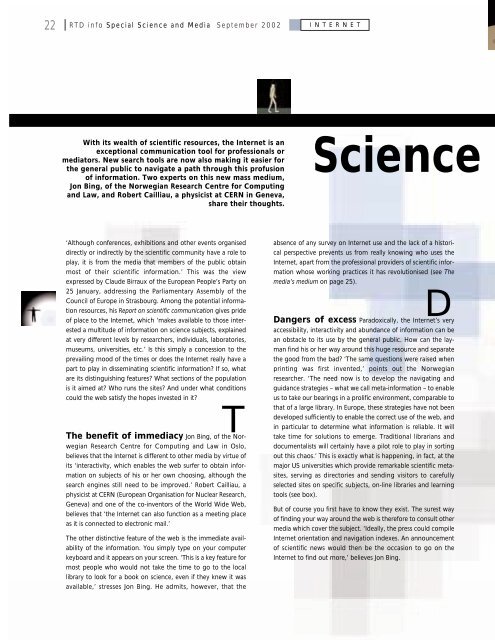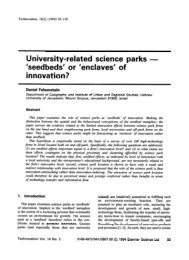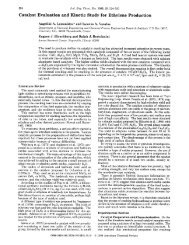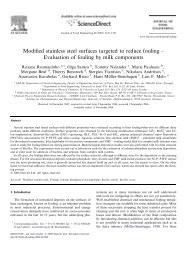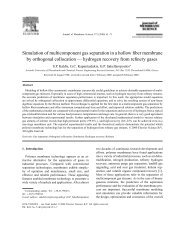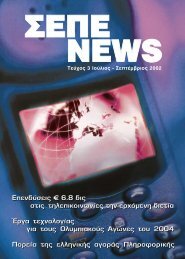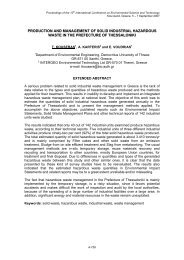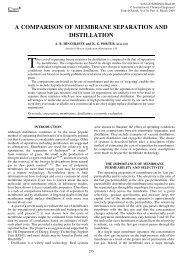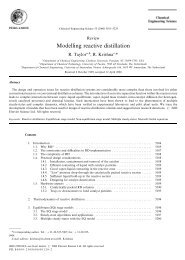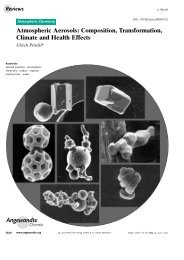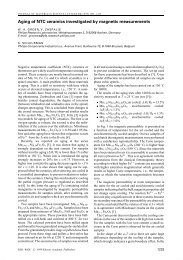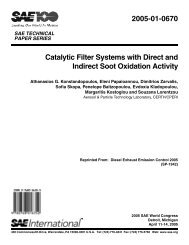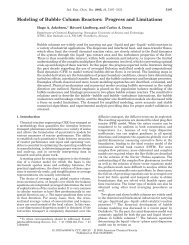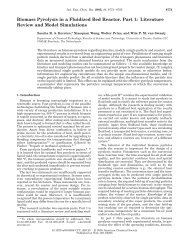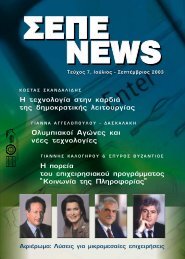RTD info - European Commission - Europa
RTD info - European Commission - Europa
RTD info - European Commission - Europa
Create successful ePaper yourself
Turn your PDF publications into a flip-book with our unique Google optimized e-Paper software.
22 <strong>RTD</strong> <strong>info</strong> Special Science and Media September 2002 I N T E R N E T<br />
With its wealth of scientific resources, the Internet is an<br />
exceptional communication tool for professionals or<br />
mediators. New search tools are now also making it easier for<br />
the general public to navigate a path through this profusion<br />
of <strong>info</strong>rmation. Two experts on this new mass medium,<br />
Jon Bing, of the Norwegian Research Centre for Computing<br />
and Law, and Robert Cailliau, a physicist at CERN in Geneva,<br />
share their thoughts.<br />
Science<br />
‘Although conferences, exhibitions and other events organised<br />
directly or indirectly by the scientific community have a role to<br />
play, it is from the media that members of the public obtain<br />
most of their scientific <strong>info</strong>rmation.’ This was the view<br />
expressed by Claude Birraux of the <strong>European</strong> People’s Party on<br />
25 January, addressing the Parliamentary Assembly of the<br />
Council of Europe in Strasbourg. Among the potential <strong>info</strong>rmation<br />
resources, his Report on scientific communication gives pride<br />
of place to the Internet, which ‘makes available to those interested<br />
a multitude of <strong>info</strong>rmation on science subjects, explained<br />
at very different levels by researchers, individuals, laboratories,<br />
museums, universities, etc.’ Is this simply a concession to the<br />
prevailing mood of the times or does the Internet really have a<br />
part to play in disseminating scientific <strong>info</strong>rmation? If so, what<br />
are its distinguishing features? What sections of the population<br />
is it aimed at? Who runs the sites? And under what conditions<br />
could the web satisfy the hopes invested in it?<br />
T<br />
The benefit of immediacy Jon Bing, of the Norwegian<br />
Research Centre for Computing and Law in Oslo,<br />
believes that the Internet is different to other media by virtue of<br />
its ‘interactivity, which enables the web surfer to obtain <strong>info</strong>rmation<br />
on subjects of his or her own choosing, although the<br />
search engines still need to be improved.’ Robert Cailliau, a<br />
physicist at CERN (<strong>European</strong> Organisation for Nuclear Research,<br />
Geneva) and one of the co-inventors of the World Wide Web,<br />
believes that ‘the Internet can also function as a meeting place<br />
as it is connected to electronic mail.’<br />
The other distinctive feature of the web is the immediate availability<br />
of the <strong>info</strong>rmation. You simply type on your computer<br />
keyboard and it appears on your screen. ‘This is a key feature for<br />
most people who would not take the time to go to the local<br />
library to look for a book on science, even if they knew it was<br />
available,’ stresses Jon Bing. He admits, however, that the<br />
absence of any survey on Internet use and the lack of a historical<br />
perspective prevents us from really knowing who uses the<br />
Internet, apart from the professional providers of scientific <strong>info</strong>rmation<br />
whose working practices it has revolutionised (see The<br />
media’s medium on page 25).<br />
D<br />
Dangers of excess Paradoxically, the Internet’s very<br />
accessibility, interactivity and abundance of <strong>info</strong>rmation can be<br />
an obstacle to its use by the general public. How can the layman<br />
find his or her way around this huge resource and separate<br />
the good from the bad? ‘The same questions were raised when<br />
printing was first invented,’ points out the Norwegian<br />
researcher. ‘The need now is to develop the navigating and<br />
guidance strategies – what we call meta-<strong>info</strong>rmation – to enable<br />
us to take our bearings in a prolific environment, comparable to<br />
that of a large library. In Europe, these strategies have not been<br />
developed sufficiently to enable the correct use of the web, and<br />
in particular to determine what <strong>info</strong>rmation is reliable. It will<br />
take time for solutions to emerge. Traditional librarians and<br />
documentalists will certainly have a pilot role to play in sorting<br />
out this chaos.’ This is exactly what is happening, in fact, at the<br />
major US universities which provide remarkable scientific metasites,<br />
serving as directories and sending visitors to carefully<br />
selected sites on specific subjects, on-line libraries and learning<br />
tools (see box).<br />
But of course you first have to know they exist. The surest way<br />
of finding your way around the web is therefore to consult other<br />
media which cover the subject. ‘Ideally, the press could compile<br />
Internet orientation and navigation indexes. An announcement<br />
of scientific news would then be the occasion to go on the<br />
Internet to find out more,’ believes Jon Bing.


